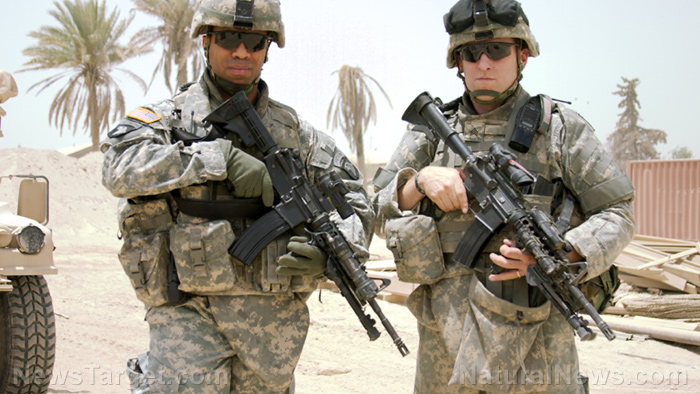
A jury in Alexandria, Virginia has ordered a military contractor to pay $42 million to three former Abu Ghraib prison detainees who were abused when serving their jail time in Iraq some two decades ago.
Consolidated Analysis Centers, Inc. (CACI), a Virginia-based defense contractor was held accountable for the mistreatment and torture the plaintiffs endured. According to National Pulse, the verdict came after a previous jury failed to reach a consensus earlier in the year.
Suhail Al Shimari, Salah Al-Ejaili and Asa'ad Al-Zubae testified to have endured beatings, sexual humiliation, forced nudity and other forms of abuse while detained. They contended that CACI's civilian interrogators conspired with military personnel to improperly "soften up" detainees.
They will receive $3 million each in compensatory damages and $11 million each in punitive damages.
CACI had a subcontracting agreement with the U.S. government back in 2003. They were reportedly paid more than $19 million just for their "interrogation services" at Abu Ghraib, a maximum security prison in Abu Ghraib, Iraq.
The prison facility was established in the 1950s and was used by former Iraqi President Saddam Hussein to hold political prisoners during his presidency from 1979 to 2003. But after the U.S. invaded Iraq in 2003, the U.S. military took over the Abu Ghraib.
In 2003, photos of imprisoned Iraqis suffering sexual abuse and physical and psychological torture at the hands of U.S. prison guards started to surface, including one of a hooded prisoner connected to electrical wires and forced to stand on a small box. He had been told he would be electrocuted if he fell off the box.
The maltreatment even resulted in the death of at least one inmate named Manadel al-Jamadi.
In September 2006, it was handed over to the Iraqis again and in April 2014, it eventually stopped operating. Now-retired U.S. Major General Antonio Taguba and now-retired U.S. Major General George Fay launched an inquiry the following year. Another investigation was launched in 2008 by the U.S. Senate Committee on Armed Services.
As a result, 11 U.S. soldiers were charged with dereliction of duty, maltreatment, aggravated assault and battery. Nine were sentenced to time in prison while others were convicted in military courts.
Meanwhile, a civil lawsuit against CACI by four Iraqi prisoners was filed in 2008 by the New York-based nonprofit Center for Constitutional Rights (CCR) on behalf of the plaintiffs, which included Al Shimari, Al-Ejaili and Al-Zubae.
The fourth plaintiff, Taha Yaseen Arraq Rashid, was removed from the case in 2019 because he was abused even before CACI was present at Abu Ghraib.
CACI's representative, John O'Connor, did not disclose whether there would be an appeal but the company maintained its stance that its employees bore no responsibility and attributed any potential misconduct to the United States Army.
CACI tried more than 20 times to have the case dismissed: A timeline
According to Al Jazeera, the defense contractor tried to have the case dismissed more than 20 times.
The news outlet collated information on what transpired from when reports of abuse and torture of detainees came out until CACI was ordered to pay three victims punitive and compensatory damages.
On June 30, 2008, CCR filed the lawsuit in a U.S. federal court for Ohio on behalf of the four plaintiffs, Then, in August of the same year, the case was transferred to Virginia.
On February 27, 2019, Rashid was dropped from the case because he was abused before CACI personnel arrived at Abu Ghraib.
Five years later, on April 15, the trial started and the victims of abuse testified in front of a U.S. jury. On May 2, the jury failed to reach a unanimous verdict and the judge declared a mistrial. The judge then granted the plaintiffs' motion for a new trial on June 14. On October 30, the retrial began in federal court in Virginia.
Finally, on November 12, the Virginia jury found CACI liable for its role in torturing the plaintiffs at the Iraqi prison.
Meanwhile, the news outlet also confirmed that this was not the only case of torture in Abu Ghraib.
In fact, initial complaints for a class-action suit on behalf of 256 Iraqi civilians who were allegedly tortured were filed by CCR and other counsel back in June 2004.
A Swedish national named Haidar Saleh was detained at Abu Ghraib twice, once by the Iraqi government before the U.S. invasion of Iraq and once by U.S. forces. In June 2011, the U.S. Supreme Court declined, without comment, to take up the case.
Meanwhile, in June 2008, Wissam Al-Quraishi and 71 others who said they had been tortured at Abu Ghraib and other prisons filed a case against another contractor, L-3 Services and Nakhla. In October 2012, a settlement was reached in that case, details of which have not been disclosed. (Related: War on Gaza: Israel has created its own Abu Ghraib – and the world is silent.)
Head over to Violence.news for more stories similar to this.
Sources for this article include:
Please contact us for more information.













